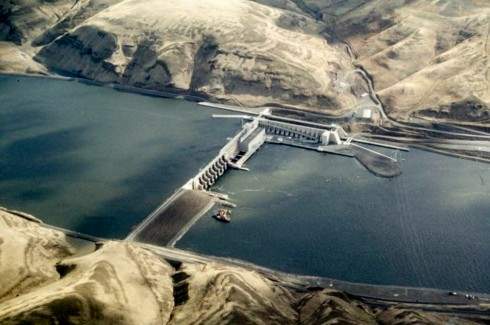forum
library
tutorial
contact

One Year Later, Simpson Dam Removal Proposal
Remains a Threat, Ag Groups Say
by Matthew Weaver
Capital Press, February 11, 2022
|
the film forum library tutorial contact |

|
One Year Later, Simpson Dam Removal Proposal
by Matthew Weaver
|
"I think there is still a very big threat out there from the environmentalists."
-- Chandler Goule, CEO of the National Association of Wheat Growers
 More than a year after Idaho Rep. Mike Simpson first announced his $33.5 billion plan to take out four Snake River dams, farm groups in the region say the threat remains.
More than a year after Idaho Rep. Mike Simpson first announced his $33.5 billion plan to take out four Snake River dams, farm groups in the region say the threat remains.
Simpson in February 2021 suggested removing the four dams, replacing their benefits, and temporarily ending all salmon litigation. The proposal was rejected by agricultural organization and environmental groups.
To date, Simpson hasn't written any legislation.
Washington Grain Commission CEO Glen Squires said he's heard that Simpson could be putting legislation together, but the representative's office denies it.
"Despite what people are saying, Congressman Simpson does not have a bill ready to go, nor is he in the process of writing one," said Nikki Wallace, his communications director. "He will review any proposal that comes forward to resolve this issue that keeps stakeholders whole, and he will continue to work to end the salmon wars in the Pacific Northwest."
Currently, no language to breach any dam has been proposed by any member of Congress, said Chandler Goule, CEO of the National Association of Wheat Growers.
Representatives of NAWG and other Snake River coalition groups on Feb. 9 met with staff of the House Committee on Transportation and Infrastructure subcommittee representing waterways.
"It is the desire of the chair and ranking member to have a bipartisan bill," Goule said. "They also said they would not anticipate any language like that being added to their bill, because that would then not make it bipartisan."
Goule and NAWG met with Simpson and his chief of staff last November.
"We did not come to an agreement, but we both came to an understanding that NAWG would continue to work against the proposal," Goule told the Capital Press. "Congressman Simpson has always been a big champion of ag. We just disagree on this particular proposal."
Goule said Simpson is concerned that as environmental groups continue to bring lawsuits over salmon, they could use the Endangered Species Act to circumvent Congress.
"I am not completely convinced that you could do that," Goule said. "Really, Congress is the only entity or body that could remove dams."
But, Goule said, "I think there is still a very big threat out there from the environmentalists."
Idaho Farm Bureau Federation, "as well as virtually every farm and ranch group in the state," remain "adamantly opposed" to breaching the dams, said Sean Ellis, Farm Bureau spokesman.
"Removing those dams would be a disaster for agriculture and many other businesses in Idaho and around the Pacific Northwest, with no guarantee doing so would help improve salmon recovery," Ellis said.
He estimates removing the dams would result in the loss of about 1,100 wheat farms in the region. According to the 2017 Census of Agriculture, there are 2,584 wheat farms in the state.
"Because wheat is an important rotation crop in Idaho and is grown in 42 of the state's 44 counties, the impact would be widespread among Idaho's agriculture industry," Ellis said.
It appears clear that Simpson remains committed to moving his proposal forward if at all possible, Ellis said.
"We regard the proposal as just as big a threat now as it was last year because of the devastating impact removing those dams would have on agriculture, power rates and much more in Idaho and around the Pacific Northwest," he said.
In October, Washington Gov. Jay Inslee and U.S. Sen. Patty Murray announced a federal-state assessment of whether the dams' services and benefits can be replaced. Ellis said the Farm Bureau believes Simpson's proposal remains the "bigger immediate threat" but will also monitor the study.
Goule says the Inslee-Murray study will duplicate already-completed environmental impact statements.
Squires said the lawmakers have a "pretty short timeframe" to release their report this summer.
"The idea of focusing on Snake River dams as the solution for solving the salmon, I think that's a concern regardless of who's promoting it," Squires said. "The local, regional and national role that the Columbia-Snake River system has is something that needs to be continually talked about and recognized."
Coalition members and NAWG are educating more lawmakers beyond the Pacific Northwest about why Simpson's plan concerns agricultural stakeholders, Goule said.
"Any time you mention ... that you're going to take away the most carbon-friendly and cost-effective method of us moving wheat through any river system of barging, it does raise a lot of antennas," he said.
Other goods moving through the river system include potatoes, corn, soybeans, beef, pork, sawdust and potash.
Goule said the industry needs to educate lawmakers east of the Mississippi River how dam breaching could increase costs by requiring a switch from barges to rail and trucks.
"It's also going to set a very dangerous precedent," he said. "We've got locks and dams up and down the Mississippi, the Ohio, the Missouri. There's dams in lots of these rivers that we are not only dependent on for urban areas and agriculture, but also for transportation."
learn more on topics covered in the film
see the video
read the script
learn the songs
discussion forum
